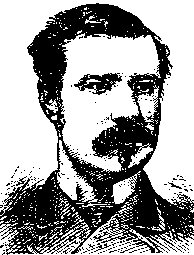Police and Other Personalities
Sir Melville Macnaghten
Not directly concerned in the Whitechapel Murders as he joined the Metropolitan Police in 1889. His memoirs and papers appear to give scant regard to 'evidence' rather than conjecture - his favoured suspect being Druitt, without any evidence. But his personal papers have been enlightening on the general approaches of the police and that investigations continued, in some way, into the early 1890s. He was convinced there were just 5 true Ripper killings.
Inspector Abberline
Chief Inspector Donald Sutherland Swanson
Appointed by Anderson to be the 'eyes and ears' for the Commissioner, Swanson, with 20 years service in the Metropolitan Police, was relieved of all other duties to concentrate on the case. Orders were given that he should see every document, paper and report relating to the inquiry (though this did not apply to the City of London Police, who did not report to the Commissioner).
John George Littlechild 
Born in Hertfordshire in 1847, joined the Metropolitan Police 20 years later. He worked in Dublin 'under cover' in 1882 investigating the Fenians. He was made head of the new Special (Irish) Branch in 1883. His office was one of those destroyed by an Irish bomb at Scotland Yard. It is likely Littlechild liaised with Swanson - who was conducting the Whitechapel Murders investigation - (a) to generally assist due to the political/public pressure and (b) due to the widespread beliefs that 'foreigners' or subversives were involved (Jews/Polish Jews; Fenians; Irish-Americans etc). He suddenly resigned in 1893 and became a private investigator (being involved in the Oscar Wilde case).
He was adamant that although the Police seemed often not to solve cases, mostly they knew the purpetrators, but did not have sustainable evidence. In 1913 Littlechild wrote a responding letter to George Sims (a journalist) with reference to the Ripper case. In the letter he maintains he had never heard of Druitt ("Dr D") as a Whitechapel suspect; but a very likely suspect was "Dr T" - he was "an American quack named Tumblety". Littlechild penned that Tumblety was a frequent visitor to London, constantly coming under the notice of he police due to his sexual practices; and he was arrested at the time of the murders (not for murder but "unnatural offences"), remanded on bail. But he absconded to France. Littlechild also said it was believed Tumblety had committed suicide (incorrect), but from that point the Ripper murders finished.
Dr. Robert Anderson
Succeeded Monro but took a month's recuperative holiday immediately he joined Scotland Yard.
James Monro
Scottish born in 1838, he spent nearly 30 years in India, where he met Macnaghten. Well-liked by his juniors, he resigned as Assistant Commissioner Metropolitan Police (CID) after breakdown of relationship with Commisioner Warren (his effective resignation date was on 31 August - when Polly Nicholls died); but replaced Warren in November 1888 after his resignation. He resigned this post in 1890 after further arguments, and returned to India. He returned to Scotland (later England) in 1905 and died in 1920 without publishing any memoirs.
Charles Warren
George R Sims (Journalist)
In a 1911 article 'Adventures of a Journalist' he wrote, under "Jack the Ripper", that three years earlier, after more sporadic press discussion on the case, and another of his own articles, a lady came to see him one night, saying the Whitechapel fiend had lodged at her house. The day after the double murder, in the lodger's room, her husband found a black bag containing a long knife and a pair of bloodstained cuffs. She thought the lodger was an American medical man. The following day he left and they told the police. She then said she had recently seen this man, in a doctor's practice in London. She passed on the address, but the authorities (convinced of this doctor's bona fides) did not pursue the matter.
Dr. Thomas Bond
Dr. George Bagster Phillips
Last updated 24 December 1999